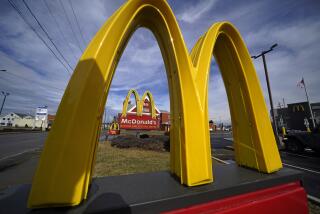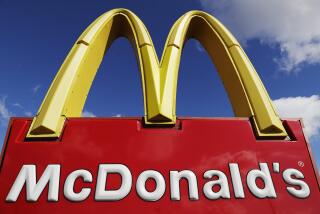‘Mad-Cow’ News Drags Down Eateries’ Stocks
- Share via
Shares of big U.S. hamburger chains, other restaurant operators and meat processor Tyson Foods Inc. tumbled Tuesday after the disclosure of the first case of “mad-cow” disease in Canada in a decade.
At the same time, shares of Hercules, Calif.-based Bio-Rad Laboratories Inc. -- which sells veterinary test kits for the disease -- soared to a record high.
Investors, fearful that consumers will shy away from eating beef because of the report, sent McDonald’s Corp. shares down $1.21, or 6.7%, to $16.95 on the New York Stock Exchange.
Also hit were Wendy’s International, which dropped $2.01, or 6.6%, to $28.55; Jack in the Box Inc., down 51 cents, or 2.5%, to $20.17; and Outback Steakhouse Inc., which fell $1.16, or 3.2%, to $35.46. All trade on the NYSE.
Tyson, the world’s largest meat processor, lost 46 cents, or 4.9%, to $9.01 on the NYSE.
Analysts said the appearance of the brain-wasting disease in a cow in Alberta, as announced by Canadian agricultural officials, raised concern because it had been thought unlikely to appear in either Canada or the United States because of safe feeding practices.
In a bid to ensure that the disease doesn’t appear in the United States, health officials promptly banned imports of cattle, beef, beef-based products and animal feed from Canada.
In Chicago, near-term live-cattle futures slid 1.5 cents, or 2%, to 72.4 cents a pound on the Mercantile Exchange.
U.S. companies quickly issued statements trying to put to rest potential consumer fears about meat safety.
“McDonald’s worldwide has the highest beef safety standards and will continue to strictly enforce them,” the Oak Brook, Ill., company said. “McDonald’s Canada only purchases beef from facilities federally inspected and approved by the Canadian Food Inspection Agency.”
The company emphasized that it does not import beef from Canada.
Outback Steakhouse said its restaurants serve only U.S. Department of Agriculture top choice or prime U.S. Midwestern grain-fed beef, raised and fed in compliance with strict U.S. regulations designed to prevent mad-cow disease.
Still, some investors chose to sell first and ask questions later.
“The discovery of one cow is concerning, even though it did not enter the food chain, as the discovery of other cases is possible,” said John Ivankoe, restaurant analyst for J.P. Morgan Securities in New York, in a note to investors. “But if confidence regarding the beef supply in only Canada is shaken, it is a relatively minor issue.”
The news provided a windfall for Bio-Rad shareholders. The company’s stock zoomed $6.10, or 12.5%, to $54.95 on the American Stock Exchange.
Bio-Rad makes the best-selling veterinary test kit for mad-cow disease and also produces screening tests for blood-borne viruses. Its shares have surged 42% this year. They jumped in April after the company reported higher first-quarter sales and earnings.
More to Read
Inside the business of entertainment
The Wide Shot brings you news, analysis and insights on everything from streaming wars to production — and what it all means for the future.
You may occasionally receive promotional content from the Los Angeles Times.










